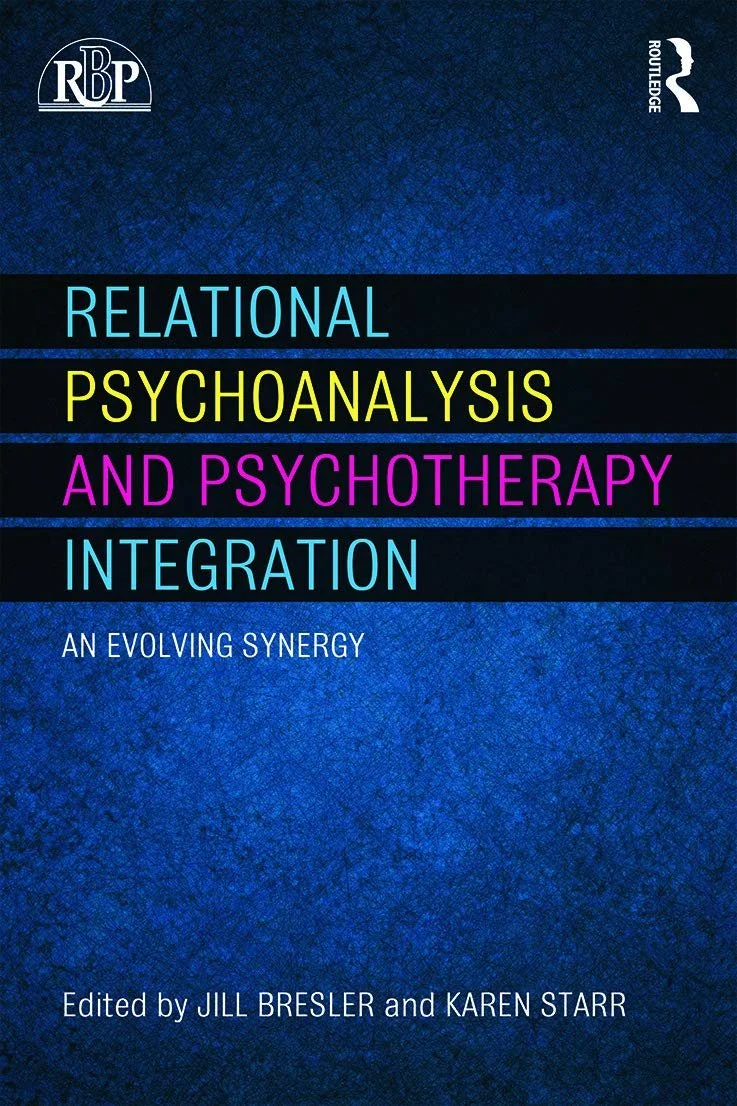Publications
Books
Relational Psychoanalysis and Psychotherapy Integration: An Evolving Synergy
Editors Jill Bresler and Karen Starr bring together an array of valuable theoretical and clinical contributions by relationally oriented psychoanalysts who identify their work as integrative. The book is organized into four segments: theoretical frameworks of integration; integrating multiple models of psychotherapy into a psychoanalytically informed treatment; working with specific populations, including substance abusers and patients with eating disorders; educating clinicians in integrative practice.
The contributions in this volume demonstrate that integrating techniques from a variety of psychotherapies outside of psychoanalysis can enrich and enhance psychoanalytic practice. It will be an invaluable resource for all practing psychoanalysts, psychotherapists, and psychoanalysts and psychotherapists in training, particulary those with an interest in relational psychoanalysis and psychotherapy integration.
Jill Bresler and Karen Starr, Routledge, 2015
A Psychotherapy for the People: Toward a Progressive Psychoanalysis
Inspired by the progressive and humanistic origins of psychoanalysis, Lewis Aron and Karen Starr pursue Freud's call for psychoanalysis to be a "psychotherapy for the people." They present a cultural history focusing on how psychoanalysis has always defined itself in relation to an "other." At first, that other was hypnosis and suggestion; later it was psychotherapy.
The authors trace a series of binary oppositions, each defined hierarchically, which have plagued the history of psychoanalysis. Tracing reverberations of racism, anti-Semitism, misogyny, and homophobia, they show that psychoanalysis, associated with phallic masculinity, penetration, heterosexuality, autonomy, and culture, was defined in opposition to suggestion and psychotherapy, which were seen as promoting dependence, feminine passivity, and relationality. Aron and Starr deconstruct these dichotomies, leading the way for a return to Freud's progressive vision, in which psychoanalysis, defined broadly and flexibly, is revitalized for a new era.
A Psychotherapy for the People will be of interest to psychotherapists, psychoanalysts, clinical psychologists, psychiatrists--and their patients--and to those studying feminism, cultural studies and Judaism.
Lewis Aron and Karen Starr, Routledge, 2013
Repair of the Soul: Metaphors of Transformation in Jewish Mysticism and Psychoanalysis
In Repair of the Soul, Karen E. Starr repositions one of the most essential psychological considerations: How do people change? In an effort to shed new light on this formidable question, she uses the metaphors of transformation of the Kabbalah, the Jewish mystical tradition, as a vivid framework to illuminate the spiritual dimension of psychic change within the psychoanalytic process.
By bringing the esoteric principles of the ancient Kabbalah into dialogue with contemporary psychoanalytic theory - in particular, the relational model - Starr examines the question of how one may achieve transformation that leads not only to insight but also to meaningful change.
Karen Starr, Routledge, 2008

Testimonials
-
"Writing with intelligence, passion, and a rigorously imaginative grasp of her two fields of discourse, she succeeds in delineating areas of vital conversation between them. Starr's book makes a valuable contribution to the contemporary awareness of issues of faith, of the ineffable other, and of the 'transcendent Third,' in analytical work."
Avivah Gottlieb Zornberg, Ph.D., author, The Beginning of Desire: Reflections on Genesis
-
"Repair of the Soul marks a milestone in the ongoing and often troubled dialogue between psychoanalysis and religion. Her consideration of the roles of faith, interpretation, and multi-leveled truth in both traditions will open many doors for the therapeutic community. Thoughtful therapists should find both challenge and inspiration in this most interesting and truly barrier-breaking work."
Rabbi Arthur Green, Ph. D., Hebrew Collegeurce
-
"An exciting interaction of sparks between psychoanalysis and Kabbalah, showing how fruitful it is when diverse dimensions of psyche and spirit meet."
- Michael Eigen, Ph. D., author, Feeling Matters
Selected Journal Articles & Book Chapters
Starr, K.E. (2023). Holier than thou: Discussion of Hoard and Bland's "How am I responsible?": Evangelical white rage and moral injury in the Interpassive perpetration of white-body supremacy. Psychoanalytic Dialogues.
Starr, K.E. (2020). Summoning spirits, bridging worlds: Writing, dreaming, working through. Psychoanalytic Perspectives.
Starr, K.E. (2018). Caught in the crossfire: Political Intersections, collisions, and confrontations. Psychoanalysis, Self and Context.
Aron, L., & Starr, K.E. (2016). Freud, Ferenczi, and the case of Schreber: A mutual enactment of homoerotic longings, homophobia, and internalized anti-Semitism. In The Budapest School of Psychoanalysis: The Origin of a Two-person Psychology and Emphatic Perspective (Rachman, A.W., Ed.). New York: Routledge.
Starr, K.E., & Aron, L. (2015). Savage inequalities. Journal of Infant, Child, and Adolescent Psychotherapy.
Aron, L., & Starr, K. E. (2015). The Ego and the Yid, Revisited. Psychoanalytic Dialogues.
Aron, L., & Starr, K.E. (2015). Freud and Ferenczi: Wandering Jews in Palermo. In The Legacy of Sandor Ferenczi (Harris, A. and Aron, L., Eds). New York: Routledge.
Starr, K. E., & Aron, L. (2013). Deconstructing the psychotherapy/psychoanalysis binary--The case for optimal marginality. Psychoanalytic Perspectives.
Starr, K. E., & Aron, L. (2011). Women on the couch: Genital stimulation and the birth of psychoanalysis. Psychoanalytic Dialogues.
Aron, L. & Starr, K.E. (2010). "Going out to meet You, I found You coming toward me": Transformation in Jewish mysticism and contemporary psychoanalysis. In Answering a Question with a Question (Lewis Aron and Libby Henik, eds), Academic Studies Press.
Starr, K. E. (2008). Faith as the fulcrum of psychic change: Metaphors of transformation in Jewish mysticism and psychoanalysis. Psychoanalytic Dialogues.


